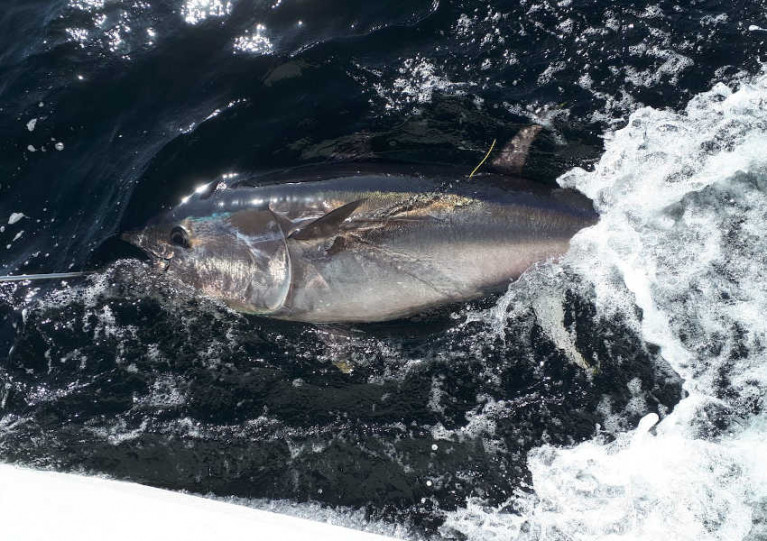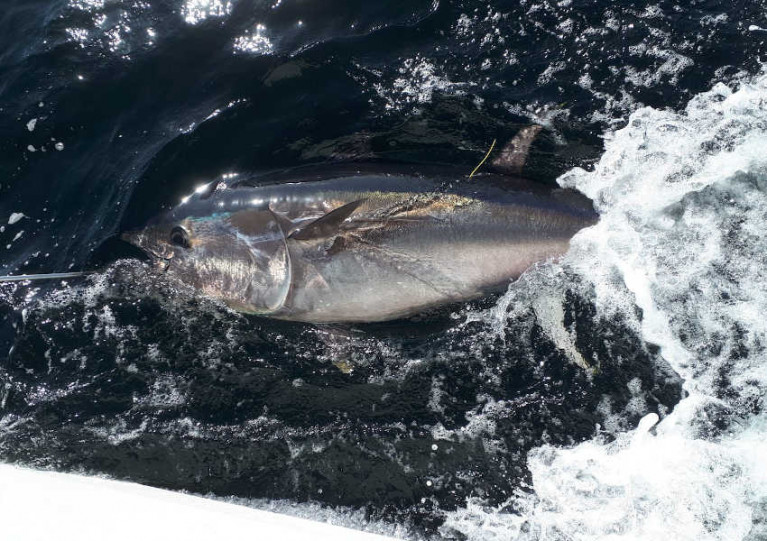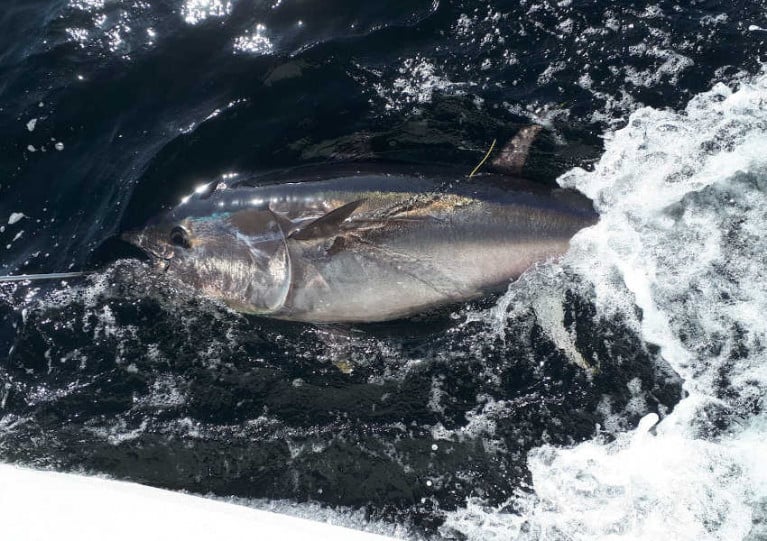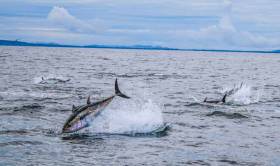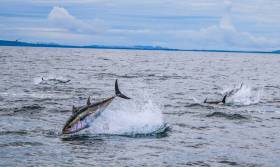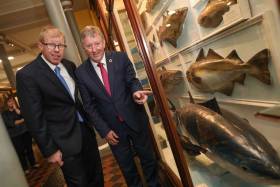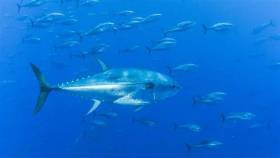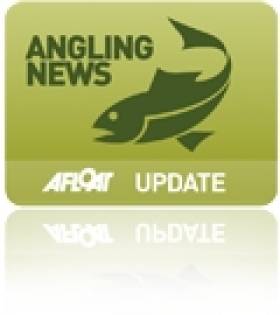Displaying items by tag: Bluefin Tuna
Anglers in Ireland are taking part in a unique ‘catch, tag and release’ programme to help Irish and international scientists learn more about the largest tuna in the world — the Atlantic bluefin tuna.
Under the Tuna CHART (CatcH And Release Tagging) programme, recreational anglers on board 22 authorised charter vessels the successfully applied to join the scheme this year will catch bluefin tuna and skippers will be tagging and releasing them back into the sea, alive, from this month to mid November.
The data collected on board authorised vessels will then be used for scientific assessment to improve knowledge of population structures, fish size and how bluefin tuna is distributed in Irish waters and throughout the North Atlantic.
Migrating through North Atlantic waters, bluefin tuna frequent Irish coastal waters to feed. Bluefin is an iconic sports-angling species and can grow up to 1,500lbs (around 680kg).
Under strictly controlled conditions, 685 bluefin tuna were caught, tagged, measured and released through the Tuna CHART programme in 2020. All bluefin tuna were caught by anglers in Irish coastal waters and then tagged by skippers. The fish is always kept in the water to ensure correct handling and tagging.
The largest tuna tagged in Ireland in 2020 was 2.75 metres long, estimated to weigh over 800 lbs (approximately 360 kgs).
Now in its third year, Tuna CHART is a collaborative scientific programme between Inland Fisheries Ireland and the Marine Institute in partnership with the Sea-Fisheries Protection Authority, the Department of Agriculture, Food and the Marine and the Department for Environment, Climate and Communications.
Environment Minister Eamon Ryan said: “The 22 angling vessels authorised by my department will contribute substantially to essential Bluefin tuna data collection as they migrate along the Irish coastline.
“The recreational fisheries sector is crucial in the delivery of this data collection programme and we look forward to continue working with all the State agencies involved.
“I want to acknowledge the key role of the authorised charter skippers and their crews who are bringing their unique expertise to bear on providing valuable data for scientific purposes, and the ‘citizen scientist’ anglers who will catch the fish. The fact that 685 fish were tagged last year with no mortalities recorded is a great achievement by the skippers.”
‘This programme also provides our coastal communities with access to a highly desired angling market that will bring a new demographic of tourists to our spectacular Wild Atlantic Way’
Marine Minister Charlie McConalogue welcomed the continuation of the programme for 2021.
“As a Donegal man, I have a keen interest in the bluefin tuna data collection programme,” he said. “I am delighted at the ongoing success of this programme as it allows our scientific partners in the Marine Institute and Inland Fisheries Ireland to collect valuable data and improve our understanding of the migratory patterns of bluefin tuna in Irish waters in a tightly controlled environment.
“This programme also provides our coastal communities with access to a highly desired angling market that will bring a new demographic of tourists to our spectacular Wild Atlantic Way.
“I am particularly pleased with the large increase in data collected in 2020, despite the restriction in place as a result of Covid and am anticipating an even more successful season this year thanks to our experienced skippers who have received authorisations for 2021.”
This year’s authorised vessels will operate out of ports in Donegal (Killybegs and Bundoran), Sligo (Rosses Point and Mullaghmore), Galway (Cleggan and Rossaveal), Clare (Carrigaholt and Kilrush), Cork (Courtmacsherry, Kinsale, Ballycotton, Union Hall, Great Island in Cobh, Baltimore and Youghal) and Waterford (Dungarvan).
All skippers have been fully trained while vessels have been fitted with a customised GPS device. Data is collected by skippers digitally by means of a specifically designed app.
Anglers looking to fish for bluefin tuna in Irish waters may only do so from an authorised charter vessel from now until 12 November 2021. The Sea Fisheries Protection Authority and Inland Fisheries Ireland are undertaking inspections and patrols around the coast to ensure that no unauthorised vessels are targeting or catching bluefin tuna.
Both organisations have also confirmed that any person engaging in fishing for bluefin tuna on a vessel which is not appropriately authorised, would be in breach of the Sea-Fisheries and Maritime Jurisdiction (Bluefin Tuna) Regulations 2019 (SI No 265 of 2019) and would face prosecution.
Like last season, skippers will have to adhere to any local or national COVID-19 public health guidelines that may be put in place. A full list of authorised skippers and vessels for the Tuna CHART programme in 2021 can be found at www.fisheriesireland.ie/bluefin.
Bluefin Tuna Data Collection Fishery Programme Returns for 2021
Building on the success of pilot programmes in 2019 and 2020, the Tuna CHART (CatcH And Release Tagging) fishery to collect scientific data on bluefin tuna will return in 2021, subject to COVID-19 restrictions.
Tuna CHART is a collaborative scientific programme between Inland Fisheries Ireland and the Marine Institute in partnership with the Sea Fisheries Protection Authority, the Department of Agriculture, Food and the Marine (DAFM) and the Department of Environment, Climate and Communications (DECC).
In 2020, the Tuna CHART programme authorised 22 charter skippers to operate a scientific fishery — in which anglers participated fully — to catch, tag and release bluefin tuna. These professional skippers were trained to tag, measure and record bluefin data.
Despite the limitations of the pandemic, 685 bluefin tuna were caught, tagged and released around the Irish coast — a 230% increase in bluefin tagged on the previous year.
 File image of bluefin tuna in Donegal Bay Photo: David Morrissey
File image of bluefin tuna in Donegal Bay Photo: David Morrissey
The most productive sites were the North-West and the South coast, mainly the waters of the Cork coastline. As many as 11 bluefin were tagged on one angling trip, a new Irish record. The largest tuna tagged was 275cm, weighing an estimated 822lbs.
All tuna were carefully handled subject to strict guidelines set by the Tuna CHART programme and all were released alive. Data from the tagging programme has been collated by the partnership for reporting to the International Commission for the Conservation of Atlantic Tuna (ICCAT).
This year a maximum of 25 authorisations may be granted to qualifying vessels and skippers around the Irish coast for fishing between 1 July and 12 November. Applications are now open and will be accepted until 1pm on Friday 9 April.
Depending on the successful operation and review of this year’s fishery, it is intended that a scientific catch-and-release fishery may also operate in 2022.
The partnership says a core aspect of the Tuna CHART programme is the welfare and successful release of the bluefin tuna. Authorised skippers will be required to have high specification rods, reels and line in advance of the open season in order to ensure that the fish is brought alongside the vessel to be measured and tagged in the water in a timely manner.
Data collection for scientific assessment is the primary purpose of the fishery and will continue to be a key requirement for skipper participation in this scientific catch-and-release fishery, the partnership adds.
Skippers will be required to collect data on every bluefin trip undertaken and each bluefin tuna they catch, tag and release, and their angling and data recording expertise is an important part of the overall survey programme.
Anglers will have an opportunity to participate in this fishery and contribute to this important scientific study by chartering and fishing from authorised vessels only. Unauthorised vessels are not permitted to target or catch bluefin tuna, and any unauthorised person found to be targeting bluefin tuna will be prosecuted. Applications for authorisations are open to charter skippers only.
Twenty-two charter angling vessels have been granted authorisation to participate in a bluefin tuna data collection programme after a successful pilot last year.
The Tuna CHART (CatcH And Release Tagging) programme will see skippers catch, tag, measure and release Atlantic bluefin tuna for data collection purposes off the Irish coast.
The authorised vessels, which are located in Cork, Clare, Galway, Sligo and Donegal, will support an international scientific programme to increase knowledge of the behaviour and abundance of bluefin tuna in Irish waters and across its distribution generally.
Atlantic bluefin tuna, the largest tuna in the world, frequent Irish coastal waters to feed during the species’ annual migration through North Atlantic waters.
The bluefin tuna is prized by sea anglers for its power and fighting ability and is a very valuable commercial species, though there is currently no sport or commercial fishery for bluefin tuna in Ireland.
The new programme, which has been developed by Inland Fisheries Ireland and the Marine Institute in partnership with the Sea Fisheries Protection Authority and the former Departments of Agriculture, Food and the Marine, and Communications, Climate Action and Environment, will operate again in 2020 having commenced on a pilot basis in 2019.
Eamon Ryan TD, minister with responsibility for inland fisheries, said: “The 22 angling vessels authorised by my department, increased from 15 last year, will contribute substantially to essential bluefin tuna data collection as they migrate along the Irish coastline.
“The recreational fisheries sector is crucial in the delivery of this research programme and we look forward to continue working with all the State agencies involved.
“I want to acknowledge the key role of the authorised charter skippers and their crews who are bringing their unique expertise to bear on providing valuable data for scientific purposes, and the ‘citizen scientist’ anglers who will catch the fish. The fact that 209 fish were tagged last year with no mortalities is a great achievement by the skippers.”
The Sea Fisheries Protection Authority and Inland Fisheries Ireland will undertake inspections and patrols around the coast to ensure this remains a strictly controlled programme.
A full list of authorised skippers can be found at www.fisheriesireland.ie/bluefin
Building on the success of last year’s Tuna CHART (CatcH And Release Tagging) pilot programme, a bluefin tuna research catch-and-release fishery for Ireland will operate in 2020.
A maximum of 25 authorisations may be granted to qualifying angling charter vessel skippers around the Irish coast for this fishery which will open on Wednesday 1 July and close on Thursday 12 November, without exception.
And depending on the successful operation and review of this year’s fishery, it is intended that a scientific catch and release fishery may also operate in 2021 and 2022.
Atlantic bluefin tuna, the largest tuna in the world, frequent Irish coastal waters to feed during its annual migration through North Atlantic waters. The bluefin tuna is prized by sea anglers for its power and fighting ability and is a very valuable commercial species.
The Tuna CHART programme is a collaborative scientific programme between Inland Fisheries Ireland (IFI) and the Marine Institute in partnership with the Sea Fisheries Protection Authority, the Department of Agriculture, Food and the Marine (DAFM) and the Department of Communications, Climate Action and Environment (DCCAE).
In 2019, the Tuna CHART pilot programme authorised 15 charter skippers to operate a scientific fishery, in which anglers participated fully, to catch, tag and release bluefin tuna.
These professional skippers were trained to tag, measure and record bluefin data and over the course of the 2019 three month season, 219 bluefin tuna were caught, tagged and released. As many as eight bluefin were tagged on one fishing trip.
All tuna were carefully handled subject to strict guidelines set by the Tuna CHART programme and all were released alive. Data from the tagging programme are being collated by the partnership for reporting to the International Commission for the Conservation of Atlantic Tuna (ICCAT).
As with the pilot programme, this year’s authorised skippers will be required to have high specification rods, reels and line in advance of the open season in order to bring the fish alongside in a timely manner. Skippers will be required to collect data on every bluefin trip undertaken and each bluefin tuna they catch, tag and release.
A call for applications for the 2020 fishing season will be announced next Tuesday 18 February and the last date for the receipt of a completed application will be 1pm on Friday 6 March.
Bluefin Tuna Catch and Release Tagging Pilot Programme Extended
While there is no sport or commercial fishery for Bluefin tuna in Ireland, a pilot Bluefin Tuna Data Collection Programme has been developed by Inland Fisheries Ireland (IFI) and the Marine Institute (MI) in partnership with the Sea Fisheries Protection Authority (SFPA) the Department of Agriculture, Food and the Marine (DAFM) and the Department for Communications, Climate Action and Environment (DCCAE) . This programme, comprising 15 authorised charter angling skippers, commenced on the 15th of August in order to catch, tag and release Atlantic bluefin tuna for data collection purposes off the Irish coast and is part of the International Convention on the Conservation of Atlantic Tuna (ICCAT) research programme which is supported by the EU Commission.
These authorised skippers with vessels operating out of ports located in Cork, Clare, Galway, Sligo and Donegal are supporting scientific work to increase knowledge of the behaviour and abundance of Bluefin tuna in Irish waters. All authorised skippers have participated in training with guidance provided around fish handling, welfare, tagging and data recording. Participants in the programme catch, tag and release Bluefin tuna while adhering to strict fish safety and handling procedures at all times.
Authorisations were originally granted to the 15 charter skippers from mid-August until mid-October. This pilot project has been very successful with 201 fish tagged and released to date with utmost consideration to their welfare. Due to the migratory patterns of Bluefin tuna, there has been little activity in the South and South West. As a result, the fishing season will now be extended for a further four weeks until the 12th of November to seek data which will help improve our knowledge of the population structure and distribution of Bluefin tuna in these regions. There will be no further extensions as lower water temperatures could hinder post-release survival of these fish after mid-November.
Minister Creed said today: “I am delighted by the excellent cooperation shown between my Department, DCCAE, SFPA, MI and the IFI in the development and management of this pilot project. The extension of the programme will provide an opportunity to gather further data and improve our understanding of the migratory patterns of Bluefin Tuna around our coasts.”
Minister Canney said: “I fully support the continued involvement of my Department and Inland Fisheries Ireland in the collaborative pilot project to collect valuable data on Bluefin tuna in Irish coastal waters. The partnership approach has led to a very successful round of data gathering with some 200 fish tagged and recorded since the pilot programme opened.
“The extension of the programme for a further four weeks will provide an excellent opportunity to encourage the collaborative effort and most importantly provide a research dividend by increasing the data collected. I have approved the issuing of renewed authorisations by my Department for the sea angling vessels participating in the initiative to continue until the 12th of November” he added.
The Sea Fisheries Protection Authority and Inland Fisheries Ireland will undertake inspections and patrols around the coast to ensure this remains a strictly controlled fishery. Anglers wishing to engage in this fishery must only do so on a sea angling vessel specifically authorised to participate in the pilot programme. Any person engaging in this fishery on any vessel which is not appropriately authorised will be in breach of the Sea-Fisheries and Maritime Jurisdiction (Bluefin Tuna) Regulations 2019 (S.I. No. 265 of 2019).
A full list of authorised skippers can be found here
Fifteen angling vessels will soon be granted authorisation to participate in Tuna CHART (Catch and Release Tagging), a pilot Bluefin Tuna Data Collection Programme.
As previously reported for Afloat.ie by Lorna Siggins, the programme will see the 15 authorised vessels catch, tag and release Atlantic bluefin tuna for data collection purposes off the Irish coast.
These vessels, which are located in Cork, Clare, Galway, Sligo and Donegal, will support scientific work to increase knowledge of the behaviour and abundance of bluefin tuna in Irish waters — which currently do not host a sport or commercial fishery for the species.
The new programme, which has been developed by Inland Fisheries Ireland (IFI) and the Marine Institute in partnership with the Sea Fisheries Protection Authority (SFPA), the Department of Agriculture, Food and the Marine and the Department for Communications, Climate Action and Environment (DCCAE), will operate on a pilot basis this year.
Authorisations will be granted from mid-August until mid-October, and all skippers and trained crew have participated in training with guidance provided around fish handling, welfare, tagging and data recording.
Participants in the programme will catch, tag and release bluefin tuna while adhering to strict fish safety and handling procedures at all times.
Marine Minister Michael Creed has welcomed the initiative. “My department has been working on this project for two years at both EU and domestic levels and I am happy to announce the commencement of the project this month,” he said.
“This initiative will allow the Marine Institute and Inland Fisheries Ireland to collect valuable data on the migratory patterns of bluefin tuna in Irish waters in a tightly controlled environment.
“This project has been a wonderful example of co-operation between my department, DCCAE, SFPA, IFI and the Marine Institute and I am looking forward to the continued development of this relationship.”
Sean Canney, Minister with responsibility for inland fisheries, added: “The angling vessels which will be receiving authorisation from my department will contribute in a very tangible way to important data collection around Bluefin tuna as they migrate past the Irish coastline.
“The recreational fisheries sector is crucial in the delivery of this pilot programme and we look forward to working with all the State agencies involved and critically with the skippers and their crews who have received authorisations in providing valuable data for scientific purposes.”
The SFPA and IFI will undertake inspections and patrols around the coast to ensure this remains a strictly controlled fishery.
Anglers wishing to engage in this fishery must only do so on a sea angling vessel specifically authorised to participate in the pilot programme. Any person engaging in this fishery on any vessel which is not appropriately authorised will be in breach of the Sea-Fisheries and Maritime Jurisdiction (Bluefin Tuna) Regulations 2019 (SI No 265 of 2019).
The rapid swimming migratory Atlantic bluefin tuna may be targeted by a limited number of Irish recreational craft under a pilot scientific research programme run by several State agencies writes Lorna Siggins.
Inland Fisheries Ireland (IFI) and the Marine Institute are seeking expressions of interest from up to 15 sea angling vessels, which would be authorised to run a catch, tag and release programme to collect data on the movements of the fish for the first time.
Atlantic bluefin tuna is the largest tuna and takes in the Irish coastline on its migratory track between the Mediterranean and the central Atlantic. It can reach a weight of over 600 kg, and over three metres in length, and can live for over 30 years.
Under International Commission for the Conservation of Atlantic Tunas (ICCAT) rules, Ireland could not allow targeted angling of bluefin tuna for data collection.
Last year, a European Commission audit had criticised the State for a “complete lack of control” over the illegal capture of bluefin tuna by sea anglers off the west coast.
It cited IFI evidence that a “targeted” recreational fishery for bluefin tuna had developed along the west coast of Ireland, with “numerous chartering companies advertising trips for tourists over the internet”.
The audit said there was evidence that some catch was being kept, landed and offered for sale in breach of regulations, given that Ireland had no quota.
However, IFI says that changes secured by Ireland at an ICCAT annual meeting last year will allow limited targeting of the species by recreational anglers, but for scientific purposes only.
The new pilot programme is being developed in partnership with the Sea Fisheries Protection Authority (SFPA), the Department of Agriculture, Food and Marine and Department of Communications, Climate Action and Environment.
Minister for Marine Michael Creed said he warmly welcomed the new pilot programme which would “build on and complement the extensive scientific work undertaken in recent years by the Marine Institute” and “increase our knowledge of the behaviour and abundance of bluefin tuna in the waters off the Irish coast”.
Applicants for the new data collection pilot programme will be assessed on the basis of previous experience in undertaking “collaborative research and scientific work”, and must have a minimum of five years’ experience of sea angling in Irish waters.
Applicants must also have experience in targeting large pelagic fish, and be equipped for same, and be willing to operate under specific authorisation controls, IFI says.
Authorisations will be valid from mid-August until mid-October of this year, IFI says, and strict fish safety and handling procedures will have to be followed at all times.
Training will be required in fish handling, welfare, tagging and data recording, and all vessels will be monitored by fisheries observers, IFI says.
Both IFI and the SFPA will “undertake inspections and patrols around the coast”, it says, and “any unauthorised skippers found targeting bluefin tuna will be prosecuted”.
It says anglers may participate in the fishery by booking places on an authorised vessel, and full details of the programme are on.
Irish Anglers to Participate in Data Gathering for Bluefin Tuna
Minister for Agriculture, Food and the Marine, Michael Creed T.D., today announced that he has secured approval at EU and international level for the introduction of a science-based catch, tag and release fishery for Bluefin tuna for Irish recreational anglers. This scheme will complement the work on satellite tagging of bluefin tuna that is being undertaken by the Marine Institute.
Minister Creed said that “As part of the negotiations on the new international management plan for bluefin tuna in the east Atlantic, Ireland was able to secure an agreement that will allow countries like Ireland, that do not have a commercial Bluefin tuna quota, to operate a catch-tag-release fishery for gathering scientific data.” This new management plan was adopted at the 2018 International Commission for the Conservation of Atlantic Tunas (ICCAT) Annual Meeting.
Minister Creed continued “My Department is currently working with the Marine Institute and the Sea Fisheries Protection Authority on a pilot project that will allow up to 15 angling vessels with trained tagging operators to target bluefin tuna in 2019. This aim of the project is to build on work undertake to date and to increase our knowledge of the behaviour and abundance of BFT in the waters off the Irish coast. It will also provide an ancillary benefit in that it will support angling tourism in peripheral coastal communities, including in particular Donegal.”
Previously, under ICCAT rules, Ireland could not allow targeted angling for bluefin tuna as we do not have a bluefin tuna quota. The changes secured by Ireland will now allow targeting for tagging purposes only by recreational anglers.
Minister Creed added “Our fishing industry has expressed concerns about the increasing numbers of Bluefin tuna in the Irish 200 miles zone and this programme will allow us to understand more about blue fin tuna - their habitat, migration patterns and concentration in waters around Ireland.”
The exact details of the pilot scheme will be developed over the coming period in consultation with the Department of Communications, Climate Action and Environment which is responsible for angling.
Donegal TD Pushes Minister To Raise Issue Of Bluefin Quota With EU
#Bluefin- A Donegal TD's push for a bluefin tuna quota for local game anglers has prompted a meeting between Marine Minister Simon Coveney and the EU Fisheries Commissioner.
According to Donegal Now, Thomas Pringle TD has welcomed the move to request a three-tonne quota for bluefin "despite the fact that I’ve brought this proposal before the Dáil on a number of occasions over the past year".
As previously reported on Afloat.ie, Inland Fisheries Ireland said that any initiative to develop a catch-and-release fishery for bluefin in Irish waters would demand struct protocols and reporting to the International Commission for the Conservation of Atlantic Tunas (ICCAT).
But the independent Dáil deputy says recreational angling for bluefin tuna "could bring huge potential for Donegal in terms of job creation and boosting tourism in the region".
Donegal Now has more on the story HERE.
Bluefin Tuna Recreational Fishery Remains Closed for the 2014 Season
#bluefintuna – Sea anglers and charter boat skippers are reminded that the Bluefin Tuna recreational fishery remains closed in 2014. Inland Fisheries Ireland (IFI) and the Sea-Fisheries Protection Authority (SFPA) have released updated information in relation to the recreational catches of Bluefin tuna in Ireland. European fisheries regulations governing the catching, landing and sale of Bluefin tuna direct states that unless a Member State has specifically assigned a portion of their annual national quota to sports and recreational fisheries to target these fish no such fishing can take place.
Current Bluefin Tuna fisheries management regulations (EU Reg 302/2009 and International Commission for the Conservation of Atlantic Tunas( ICCAT) Recommendation 12-03) stipulate that recreational and sport fisheries may be facilitated by Member States by allocating a specific national Blue Fin Tuna quota to the sectors, but because Ireland does not have a quota the EU has advised that a specific recreational fishery cannot be operated.
Dr Ciaran Byrne, CEO of IFI said: "IFI is supportive of hard-pressed coastal communities and the marine sector in particular and are aware of the economic boost which recreational angling can bring to such peripheral communities. In this regard, IFI continues to actively investigate the possibility of operating a recreational bluefin tuna catch and release fishery."
Any initiative by IFI to develop a catch and release fishery for recreational fishers in Irish waters will demand strict catch-and release protocols with obligatory catch logging and reporting to the International Commission for the Conservation of Atlantic Tunas (ICCAT). Such a proposal from Ireland will need the input and support of Ireland's regulatory maritime agencies to prepare a submission for consideration by the Scientific Committee ICCAT and the European Commission.
In the meantime, any Bluefin Tuna mortalities arising from fish accidentally caught in the course of angling must be notified to SFPA who are charged with the enforcement of the above regulations. The fish will be confiscated and disposed of.
Susan Steele, Chair of the SFPA said: "Ireland does not have a direct fishery for Bluefin Tuna in Ireland. Ireland does have a 1% by catch of Bluefin Tuna as part of the Northern Albacore fishery. The vessels that partake in the Northern Albacore fishery must obtain a specific fishing authorisation from the Department of Agriculture, Food & Marine. For anyone engaged in sports or recreational sea angling this means that if a Bluefin Tuna is caught while sea angling it has to be immediately released as the fish cannot be targeted or landed by an Irish boat."


























